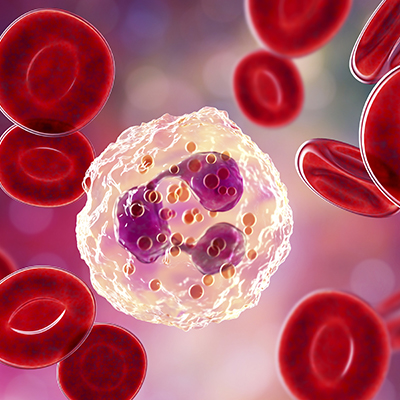September 8, 2022 -- Researchers at The Wistar Institute and Jubilant Therapeutics have found an enzyme in neutrophils that promotes tumor growth and metastasis, pointing to a new way to treat cancers.
In a study published September 7 in the journal Cancer Research, the researchers describe their analysis of mouse models in which tumor growth was accompanied by significant increases in the activity of the enzyme, neutrophil peptidylarginine deiminase 4 (PAD4).
The findings led the researchers to treat mice with a small molecule PAD4 inhibitor and to perform the targeted deletion of PAD4 in neutrophils. Both approaches reduced primary tumor growth and lung metastases while increasing the efficacy of immune checkpoint inhibitors.
"Development of metastases remains a leading cause of death from cancer. Tumor-associated neutrophils have long been implicated in cancer progression. Understanding the mechanisms by which these cells promote tumor growth and metastatic spread is critically important for the development of new treatments," Dr. Yulia Nefedova, PhD, corresponding author on the paper and associate professor at The Wistar Institute, said in a statement.
Earlier research showed neutrophils, a type of white blood cell, are involved in the formation of premetastatic niches. Metastasis is responsible for about 80% to 90% of cancer-related mortality. Given that metastases are associated with poor outcomes, the research suggested that targeting neutrophils may be a way to address some of the biggest outstanding unmet medical needs in the solid tumor space.
Nefedova and her collaborators advanced that idea using transplantable and genetically engineered mouse models to show that PAD4 activity is significantly increased at times of tumor growth. Deleting PAD4 in neutrophils decreased levels of white blood cells in tumors, slowed the growth of primary tumors, and reduced lung metastases.
The researchers showed that PAD4 mediates neutrophil accumulation by regulating the expression of the CXC chemokine receptor 2 (CXCR2). In neutrophils from lung and colon cancer patients, PAD4 expression and activity and CXCR2 expression were significantly upregulated compared to cells from healthy donors. PAD4 and CXCR2 expression were positively correlated in the neutrophils taken from cancer patients.
To assess the therapeutic implications of the findings, the researchers administered a PAD4 inhibitor, Jubilant Therapeutics' JBI-589, to mice with tumors. The drug candidate tackled both primary tumors and lung metastases while increasing the effect of immune checkpoint inhibitors. Jubilant and Wistar disclosed a PAD4 collaboration early last year, although that project was focused on COVID-19.
Based on evidence generated to date, Jubilant sees its PAD4 inhibitors as treatments for metastases in patients with colorectal and pancreatic cancers, as well as in individuals with liver metastases. The biotech firm is also continuing to look at acute and chronic autoimmune and inflammatory diseases.
"These results highlight the potential of PAD4 inhibition as a novel treatment approach for cancer in addition to the previously established role of this pathway in autoimmune diseases," said Luca Rastelli, PhD, Jubilant's chief scientific officer. "We are developing several highly selective oral, small-molecule PAD4 inhibitors, with the goal of bringing this novel mechanism to the clinic as potential therapeutics for tumor metastasis in colorectal and pancreatic cancers, patients with liver metastasis, as well as for both acute and chronic autoimmune/inflammatory diseases."
Copyright © 2022 scienceboard.net








